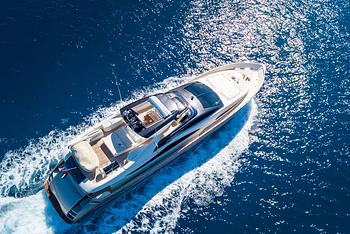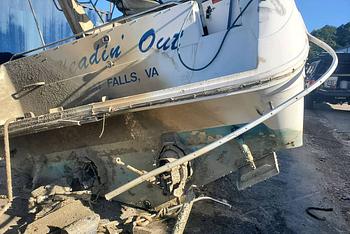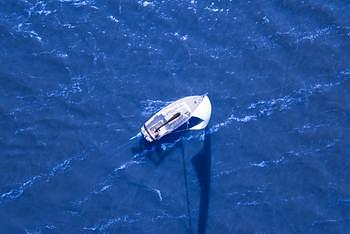Arranging boat insurance might be one of the least glamorous parts of buying a boat, but it’s vital that you have it in place before hitting the water. While millions of people go boating without incident every year, there are many possible issues that could arise, and it’s best to plan for the worst and expect the best.
Boat insurance covers everything from accidents to theft, fire, and storms, as well as public liability in the event your boat causes damage to someone else or their property. Having the right insurance policy in place will give you peace of mind and smooth out your boating experience even when you hit a rough patch.

Do I Need Boat Insurance?
The answer here is probably yes, but it depends on what kind of vessel you’re buying. Small boats with low-powered engines, canoes and kayaks, paddle-powered dinghies (under 25hp), or boats worth less than $1,000 may not require boat insurance. However, it’s highly recommended that motorboats, sailboats, yachts, and personal watercraft such as large JetSkis and Wave Runners always be insured.
In the United States, some states require all motorized boats to have some level of boat insurance, although it is not mandatory in every state. Even where it isn’t required, though, we recommend that you put it in place. According to the US Coast Guard, in 2019 boating accidents caused $55 million in property damage, while in 2021 that figure rose to $67.5 million. There are about 4,000 boating accidents each year, and having insurance will mean that if your number comes up, you, your assets, and any liability will be covered.
10 of the Most Common Boat Insurance Claims
Many boat insurers report out the type of boat-insurance claims that occur most frequently, and the following “top 10” regularly make their lists:
- High winds: Storms, tornados, or even strong winds regularly cause significant damage to boats even when they’re tied up safely in a marina.
- Sinking: Boats can sink for various reasons, whether it’s following a collision or mechanical failure, and recovering one is very expensive.
- Hurricanes: Insuring boats in regions of the world where hurricanes are common will require a special hurricane add-on so be sure to check that the policy covers it.
- Fire: Fires can be caused by cooking accidents, electrical faults, and many other reasons. They can easily damage or totally destroy your boat and put everyone aboard in serious danger.
- Collision with another vessel: Running into another boat will have huge financial implications both for your damaged boat and the one you hit, and you might be liable for enormous sums of money. It’s critical that you have hull and liability coverage for .
- Collision with an underwater object: Hitting an object underwater can seriously damage your boat’s hull or even cause it to sink.
- Running aground: Rising and falling of tides mean that running aground is more common than you might think, and being rescued and having your boat repaired can be extremely costly.
- Theft of your boat: Having your beloved boat and expensive asset stolen is devastating, and it sadly does happen. With the right insurance you’ll soon be covered and boating again.
- Theft of belongings: Even if your boat is left unharmed, theft of expensive equipment and personal belongings can still be costly to replace.
- Lightning: Lightning strikes are more common in certain geographical regions than in others, but if it happens that your boat is struck by lightning, the damage can be extremely expensive to repair.
Why not use my homeowners insurance?
Theoretically, homeowners insurance can work, and if your policy provides coverage for boats, then there’s no reason why you shouldn’t use that for smaller boats and motors, usually those with a horsepower limit of 25 to 100hp. However, for larger and more expensive boats, or if your homeowners insurance policy doesn’t cover any vessels, taking out a separate policy with a specialized marine insurance provider is a must. It’s also important to note that most homeowners insurance policies only cover specified boats on inland waters and not coastal regions.
What Does Boat Insurance Cover?
Ultimately your insurance policy will cover what you need it to cover, and no two policies are necessarily going to be alike. Coverage you should consider for your boat includes:
- Bodily injury liability: This includes any medical bills, loss of income, or pain and suffering to another person that you may cause with your boat. Personal and property liability insurance can be bought separately from a full-coverage policy and should be the minimum you get. In fact, most marinas and shipyards will insist you provide liability coverage, at least.
- Property damage liability: Your policy would cover you for any damage you might cause to someone else’s property, whether that’s another boat or a part of the dock. It often includes coverage for fuel-spill clean-ups or wreckage recovery (it is your legal obligation to have your boat salvaged). Generally, liability limits start at $100,000, but you can choose to increase that to at least $500,000 or $1,000,000 of protection.
- Collision coverage: This coverage will ensure that any damage caused to your boat from a collision, whether that’s with another boat or an object, is paid for to a greater or lesser degree by your provider (see Types of Boat Insurance below). It is often a separate part of the policy and not always included as standard, so if it’s something you want then be sure to check the inclusions and exclusions and add it to your package.
- Comprehensive or ‘all-risk’ coverage: This is the most thorough coverage and covers your boat against any damage that occurs that isn’t through a collision. It could include theft, vandalism, and fire damage, as well as hurricanes, flooding, and hail although these vary by provider.
Common coverage add-ons
There are many policies and inclusions that you can get for your boat including:
- Roadside assistance if towing your boat
- Trailer coverage
- Wreckage removal
- Watersports coverage
- Fuel spills
- Salvage
- Fishing equipment coverage
- Trip interruption
- Towing of your boat in case of a breakdown or accident
- Specialized coverage for something specific such as navigation equipment
- Consequential damage which covers wear and tear rather than an accident and includes rot, mold, and corrosion
- Cruising extension if you plan to leave your territorial waters
Common policy exclusions
Make sure you know what is and isn’t included in a particular policy by reading through the small print. Common exclusions include;
- Wear and tear, denting, or scratches
- Faulty parts, manufacturer’s defects, or design issues. It’s best to use a warranty if you have one in this instance
- Faulty machinery caused by lack of maintenance
- Any damage that you caused while you were under the influence of alcohol or drugs
- Any damage caused by marine animals such as whales or dolphins
- Any damage caused by infestations of anything from mussels to fleas
- Any accidents which were caused when you were beyond your pre-approved navigational limits
- Any damage which occurs because of improper transportation or storage
- Any damage caused by a person driving the boat who is not named on the policy

What Factors Affect the Price of a Policy?
As with car insurance, there are many factors which can affect the price of your boat insurance. The policy inclusions and exclusions that we’ve seen above will play a big role in the overall cost, but so too will the following:
- The age of the boat
- The length of the boat
- The type of boat
- How much the boat is worth
- The engine size/horsepower
- The condition of the boat (on a used boat, your insurance provider will likely ask for a marine survey to be carried out to ascertain its condition)
- Where you (and the boat) reside
- Whether you live on the boat full-time
- Where the boat will be used i.e on inland waters, coastally, or on the ocean
Types of boat insurance
We’ve seen above that there are many different policies and add-ons, but there are essentially two basic types of boat insurance that you can buy, and they focus on how depreciation of your boat is approached.
- Agreed value policy: This coverage is based on the value of the boat when the policy was taken out. It is generally a more expensive policy because, in the case of an accident and your boat is a total loss, the provider won’t deduct depreciation when issuing a replacement amount.
- Actual cash value: This policy, in the case of total loss of the boat, would pay up to the cash value of the boat at the time of the incident, and not the replacement cost. This is more commonly used for older boats, and the policies are considerably cheaper.
How Much Does Boat Insurance Cost?
Boat insurance is comparable to car and RV insurance costs, and the average is around $200 to $750 a year. When talking about much larger or more expensive yachts, then the general rule of thumb is 1 to 5 percent of the value of the boat. As we’ve seen however, there are many factors that affect the cost, from the type of boat you have to the type of policy and add-ons you choose.
Also, factors such as where you live and where you’ll be cruising make a big impact on the cost of insurance. In the United States, for example, insurance tends to be less in states with no coastline as boats are typically smaller than those cruising coastally. Likewise, the northern states have shorter boating seasons and therefore policies tend to be less than in southern states where boating seasons are longer.
Many marine insurance providers offer discounts to new and existing customers and it’s worth asking about them and seeing if you qualify for any as it could save you money over the year. Some discounts worth asking about to get the best boat insurance rates include;
- Holding boating safety qualifications
- Having safe-operating records
- Using a diesel-powered engine
- Carrying marine radios, fire extinguishers, and other safety equipment on board
- Paying annually versus monthly for your policy
- Having a good no-claims record
- Bundling your boat, car, and home insurance with the same provider
Other ways you could lower your policy include;
- Lowering the liability limits: The lower the limit, the lower the cost of the policy
- Lowering the deductible: You can choose what deductible you have for each claim. The lower the deductible, the higher the premium
- Reduce or remove towing requirements: Towing coverage can be very expensive and even go into the thousands of dollars, so you could choose to reduce your coverage to save money

How Do I Choose a Boat Insurer?
Choosing boat insurance is much the same process as choosing car or home insurance. There are many providers to choose from, each offering different policies, packages, exclusions, and benefits, so it’s important to know what coverage you need and shop around. Here are some tips to help you choose a boat insurer;
- You can use a boat insurance agency such as the National Boat Owners Association (NBOA) which will connect you with the right insurance provider for your boat and circumstances.
- Look at the exclusions and restrictions on each policy before making a final decision. You don’t want to have an accident only to find out that it isn’t covered under your policy (more on exclusions below).
- Make a shortlist and compare all the benefits and exclusions against each other. While one company may seem better priced, they may not offer such comprehensive coverage. For example, one company might offer towing as a standard inclusion, whereas another will have it as an optional add-on.
- Read some reviews on your short-listed companies and see what others think of their customer service, especially those who have had to make claims.
Some of the best boat insurance providers in the United States
There are quite literally hundreds of marine insurance providers in the United States, and choosing is difficult. We have rounded up some of the best boat insurance companies and what they’re good for.
- Progressive: Best for discounts and value for money
- Foremost Insurance Group: Best for insurance packages that can be tailored by boat type, age, or coverage level you want.
- Allstate: Best for low-cost insurance policies
- Nationwide: Best for policy bundling with home or car insurance
- Chubb and AIG: Best for large or expensive yachts
- BoatUS/Geico: Best for member benefits such as free boater safety courses, towing and emergency assistance plans, as well as discounts on charter cruises, fuel, supplies, storage, and repairs.
- Markel Insurance: Best for commercial boat insurance if you want to charter your boat out, offer tours, do any commercial fishing, or other businesses to make money with your boat.
- Ace: Best for variety of boats covered including houseboats




